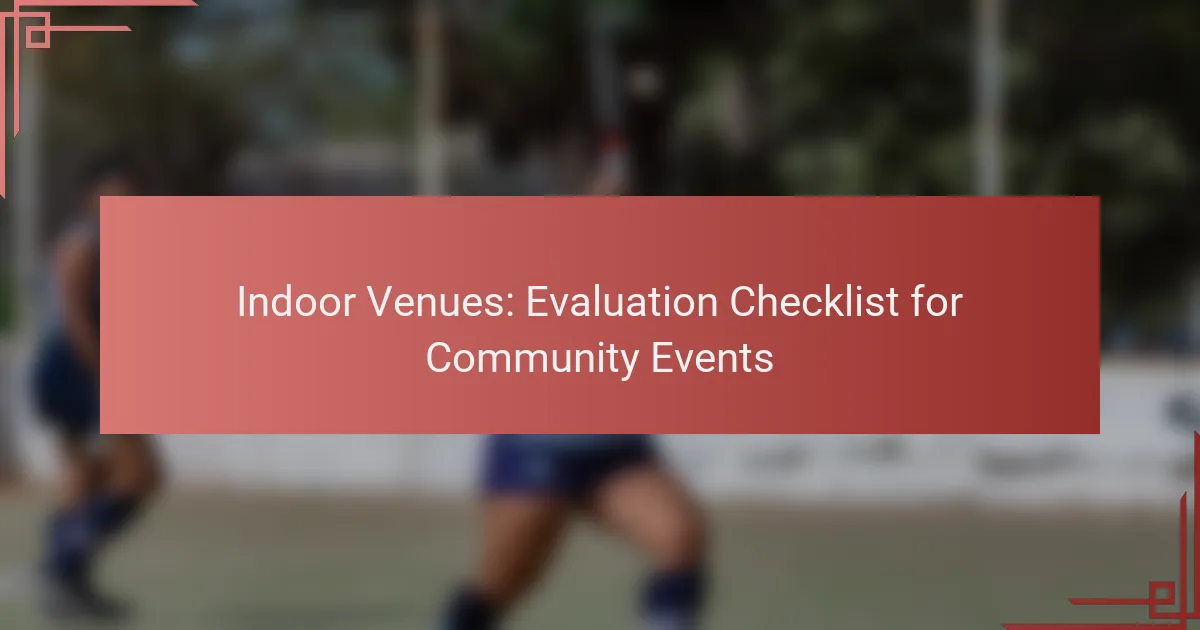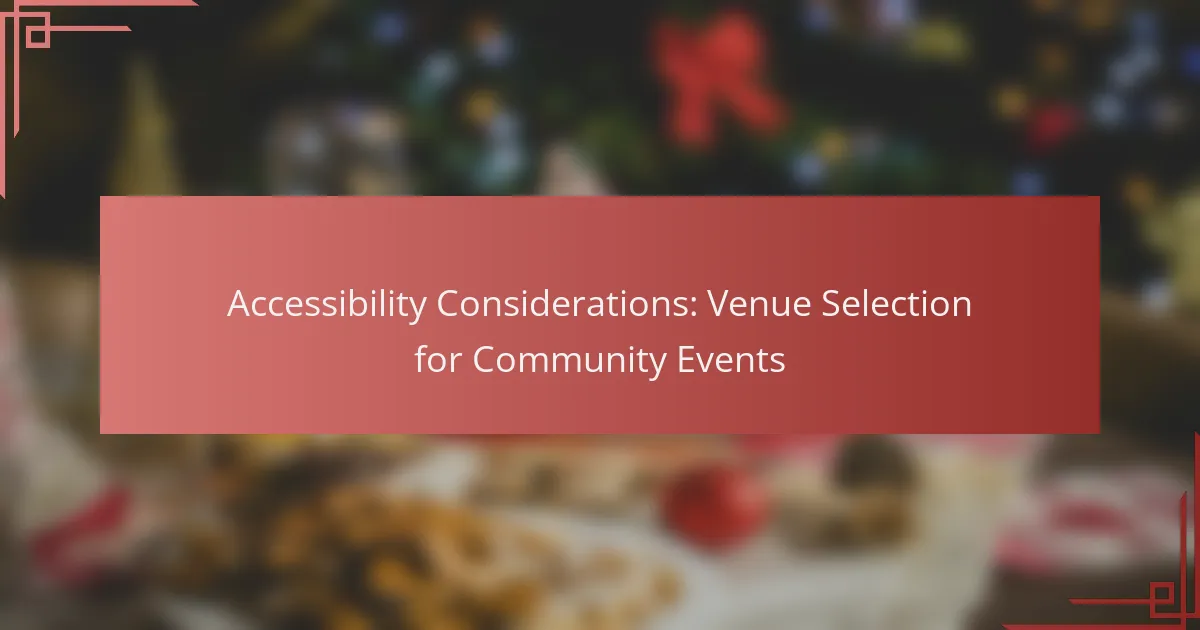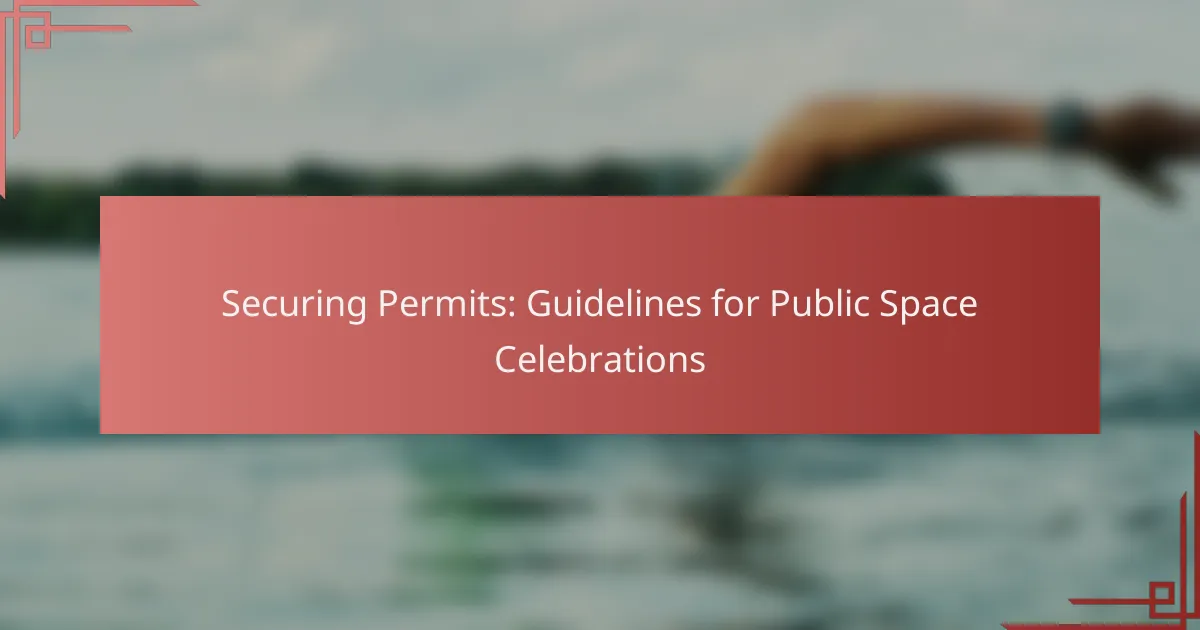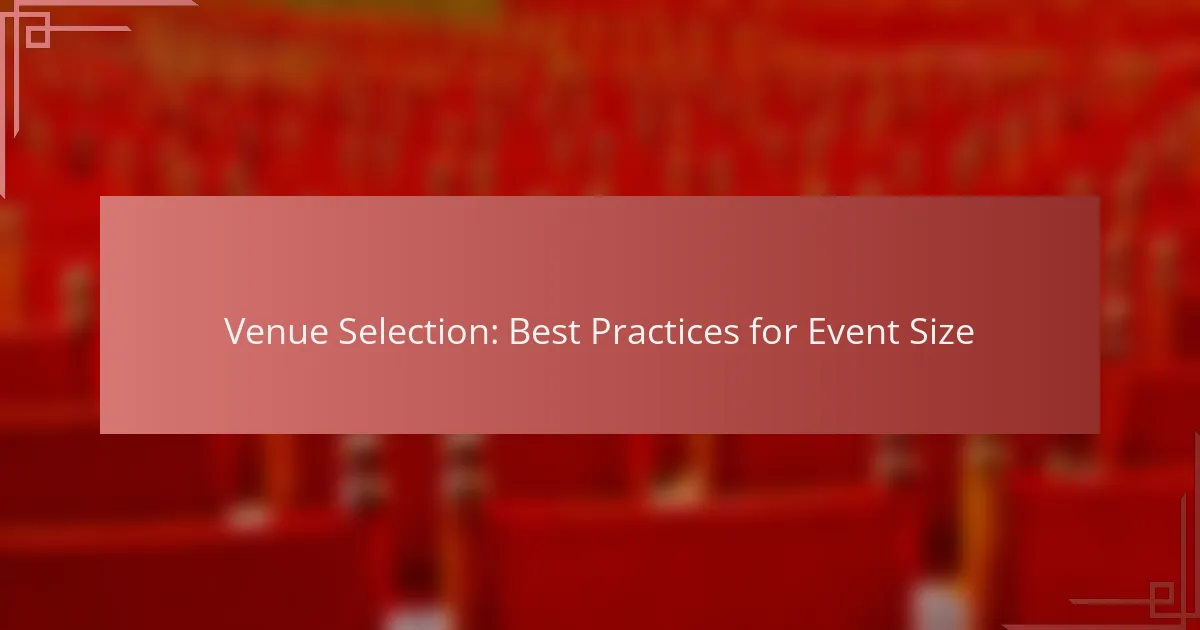Selecting the right indoor venue for community events is crucial for their success. Key considerations such as capacity, accessibility, location, and cost play a significant role in ensuring that the venue aligns with the event’s objectives and audience needs. By thoroughly evaluating these factors, organizers can mitigate common challenges and enhance the overall experience for attendees.
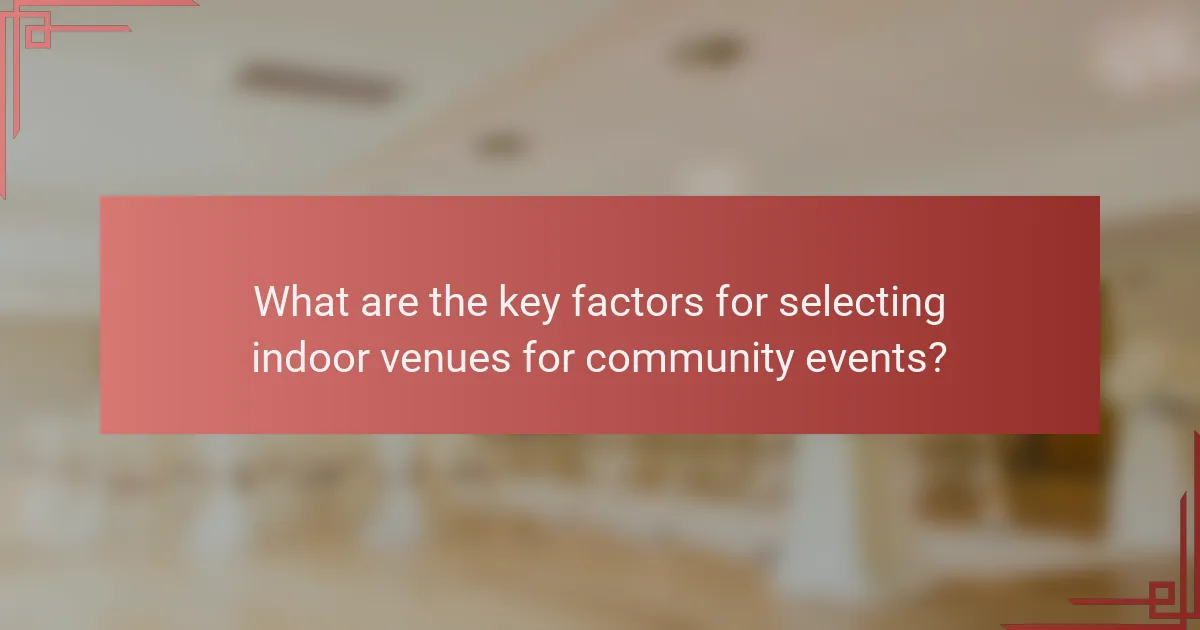
What are the key factors for selecting indoor venues for community events?
When selecting indoor venues for community events, key factors include capacity, accessibility, location, cost, and available amenities. Evaluating these elements ensures that the venue meets the needs of attendees and supports the event’s goals.
Capacity and layout
Capacity refers to the maximum number of attendees the venue can accommodate comfortably. It’s essential to choose a space that not only fits the expected crowd but also allows for movement and interaction. Consider the layout as well; an open floor plan may be more suitable for networking events, while theater-style seating may work better for presentations.
As a general rule, aim for a venue that can hold at least 20-30% more than your expected attendance to allow for flexibility. Always check the fire code regulations to ensure compliance with safety standards.
Accessibility features
Accessibility features are crucial for ensuring all attendees can participate fully in the event. Look for venues that offer wheelchair access, accessible restrooms, and accommodations for those with hearing or visual impairments. These features not only comply with regulations but also promote inclusivity.
Consider conducting a walkthrough of the venue to assess its accessibility firsthand. This can help identify any potential barriers and ensure that the space is welcoming for everyone.
Location and parking availability
The location of the venue should be convenient for the majority of attendees. Ideally, it should be situated near public transportation and major roadways. Additionally, assess the parking availability; ample parking can significantly enhance the attendee experience.
When evaluating parking, consider both the quantity of spaces and any associated costs. Free parking is a significant advantage, while paid parking may deter some attendees. Aim for a venue that offers a balance of accessibility and affordability.
Cost and rental terms
Cost is a critical factor in venue selection. Understand the rental terms, including any deposits, cancellation policies, and additional fees for services like cleaning or equipment rental. Compare costs across multiple venues to find the best value.
Be cautious of hidden fees that can inflate the overall cost. Always request a detailed breakdown of all charges to avoid surprises later in the planning process.
Available amenities
Available amenities can enhance the overall experience of your event. Look for venues that provide essential services such as audio-visual equipment, Wi-Fi, and catering options. These amenities can save time and reduce the need for additional vendors.
Evaluate the quality of these amenities as well; for instance, reliable Wi-Fi and modern audio-visual equipment can significantly impact the success of presentations and workshops. Prioritize venues that offer the resources necessary to meet your event’s specific needs.
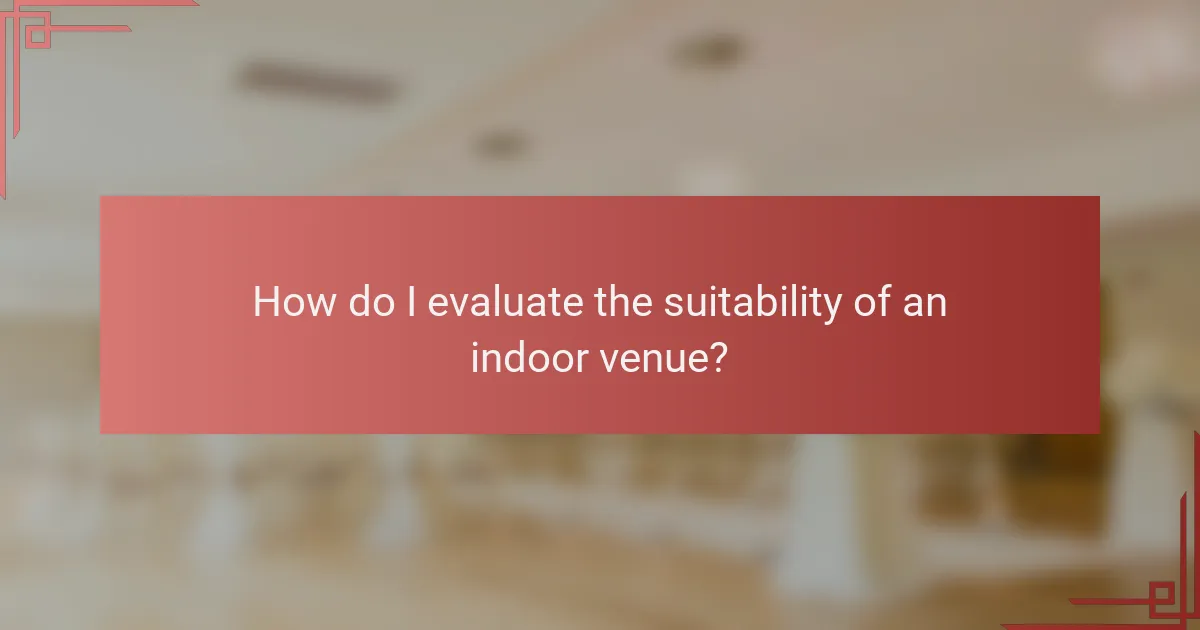
How do I evaluate the suitability of an indoor venue?
To evaluate the suitability of an indoor venue for community events, consider factors such as location, capacity, facilities, and accessibility. A thorough assessment ensures the venue meets the specific needs of your event and audience.
Site visits and inspections
Conducting site visits allows you to assess the venue’s layout, condition, and amenities firsthand. Pay attention to the space’s size, lighting, ventilation, and overall cleanliness. Ensure that the venue can accommodate your expected number of attendees comfortably.
During the inspection, check for essential facilities such as restrooms, parking availability, and emergency exits. Take notes and photographs to help you remember key details when comparing venues later.
Feedback from previous users
Gathering feedback from individuals or organizations that have previously used the venue can provide valuable insights. Ask about their experiences regarding service quality, staff responsiveness, and any issues encountered during their events.
Consider reaching out through online reviews or directly contacting past users. This information can highlight strengths and weaknesses that may not be apparent during a site visit.
Comparative analysis of options
Once you have gathered information from site visits and user feedback, create a comparative analysis of your top venue choices. List key attributes such as cost, capacity, location, and available services side by side to identify the best fit for your event.
Be mindful of trade-offs; for example, a venue with a lower rental cost may lack certain amenities or accessibility features. Prioritize the factors that are most important for your specific event to make an informed decision.
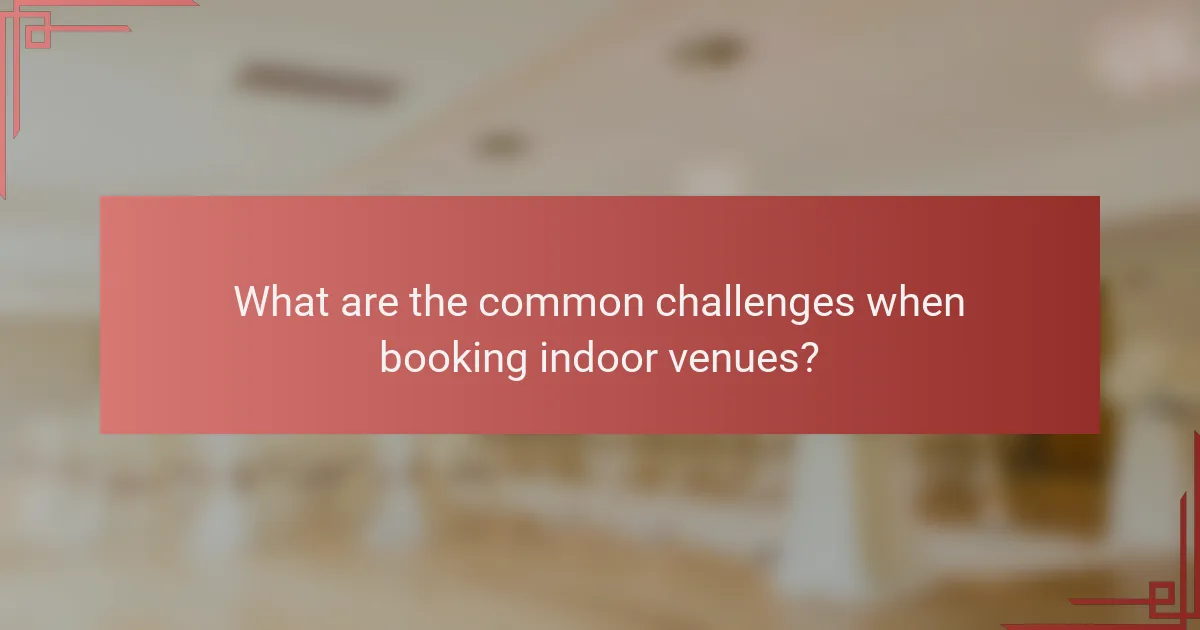
What are the common challenges when booking indoor venues?
Common challenges when booking indoor venues include limited availability during peak seasons, high rental costs, and inadequate facilities for specific events. Understanding these issues can help organizations plan more effectively and avoid potential pitfalls.
Limited availability during peak seasons
Indoor venues often experience high demand during peak seasons, such as holidays or major local events. This can lead to limited availability, making it difficult to secure a preferred location on desired dates.
To navigate this challenge, consider booking well in advance, ideally several months ahead. Flexibility with dates and times can also increase your chances of finding an available venue.
High rental costs
Rental costs for indoor venues can vary significantly based on location, size, and amenities. In urban areas, prices may range from hundreds to thousands of dollars per day, especially during peak times.
To manage costs, explore venues that offer tiered pricing based on the day of the week or time of day. Additionally, consider negotiating rates or looking for community spaces that may offer lower fees for local events.
Inadequate facilities for specific events
Some indoor venues may not have the necessary facilities to accommodate specific types of events, such as technical equipment for presentations or adequate space for large gatherings. This can hinder the overall experience for attendees.
Before booking, assess the venue’s amenities against your event requirements. Create a checklist of essential features, such as seating capacity, audio-visual equipment, and accessibility options, to ensure the venue meets your needs.
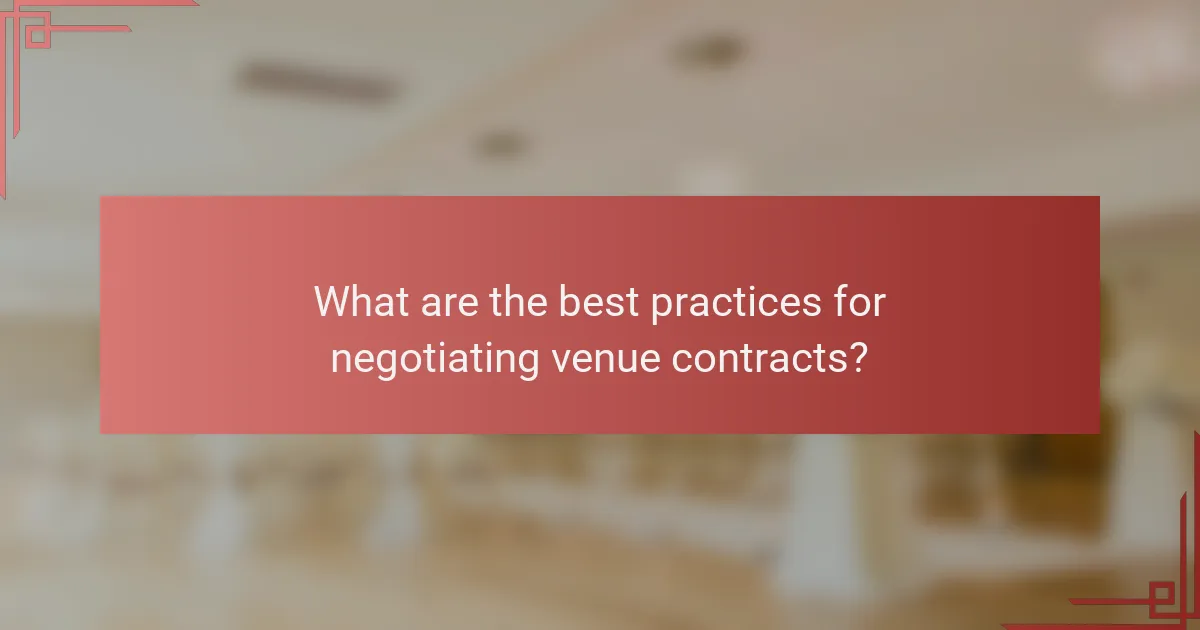
What are the best practices for negotiating venue contracts?
Effective negotiation of venue contracts involves understanding key terms, being clear about your needs, and ensuring flexibility in the agreement. Focus on cancellation policies, additional services, and payment terms to secure a favorable arrangement.
Understanding cancellation policies
Cancellation policies dictate the terms under which you can cancel the venue booking and the penalties involved. It’s crucial to clarify whether you can receive a full refund, a partial refund, or if any fees will apply if you need to cancel.
Common practices include a grace period for cancellations, often ranging from a few days to several weeks before the event. Always ask for written confirmation of the cancellation terms to avoid misunderstandings later.
Requesting additional services
When negotiating a venue contract, inquire about additional services that may enhance your event, such as catering, audiovisual equipment, or security. Many venues offer packages that include these services at a discounted rate.
Be specific about your needs and ask for a detailed breakdown of costs associated with these services. This can help you compare options and avoid unexpected expenses. Don’t hesitate to negotiate these terms to fit your budget.
Clarifying payment terms
Payment terms outline when and how much you need to pay for the venue. Clarify whether a deposit is required, the total cost, and the timeline for final payments. Understanding these terms can help you manage your budget effectively.
Some venues may offer flexible payment plans or discounts for early payments. Always confirm if there are any late fees or penalties for missed payments to avoid surprises. Keep a record of all payment agreements in writing for reference.
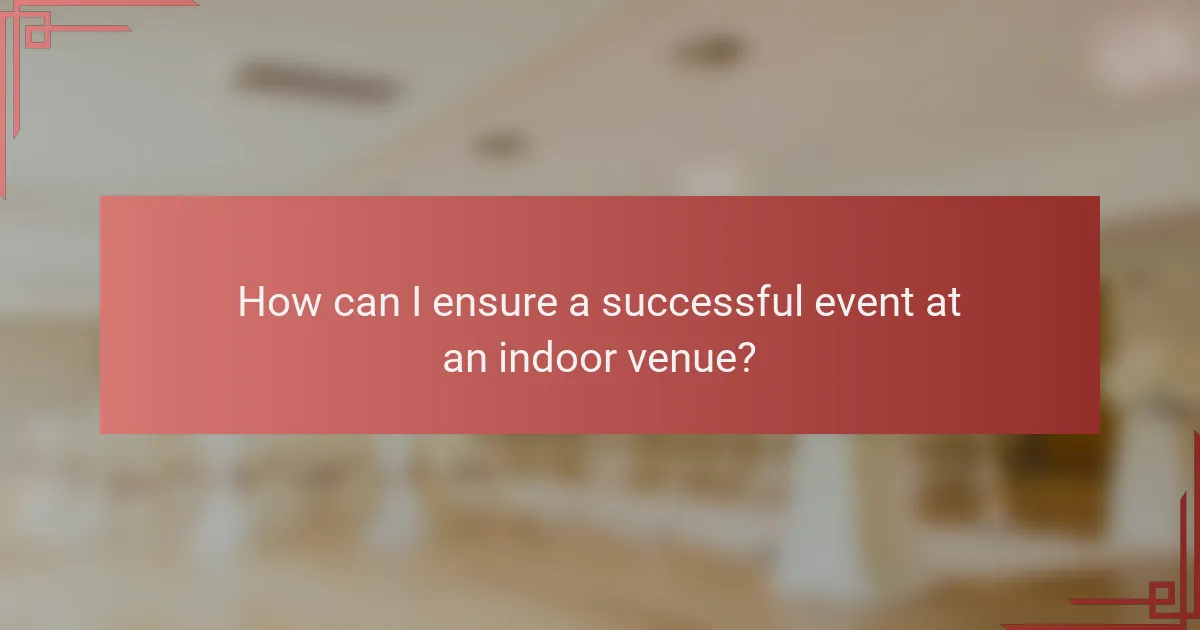
How can I ensure a successful event at an indoor venue?
To ensure a successful event at an indoor venue, focus on thorough planning and effective communication. Understanding the venue’s capabilities and limitations is crucial for a smooth experience.
Effective communication with venue staff
Establishing clear communication with venue staff is essential for addressing any logistical concerns. Schedule a meeting well in advance to discuss your event’s needs, including setup times, catering options, and any special requirements.
During your discussions, confirm the contact person for the event day. This ensures you have a direct line for any last-minute issues or adjustments. Keep an open line of communication leading up to the event to address any changes or questions that may arise.
Planning for technical requirements
Assess the technical requirements of your event early in the planning process. This includes audio-visual equipment, internet access, and power supply needs. Verify what the venue provides and what you need to arrange externally.
Consider creating a checklist of technical specifications to ensure nothing is overlooked. For example, if your event includes presentations, confirm the availability of projectors and screens. Test all equipment before the event to avoid any disruptions during the program.
